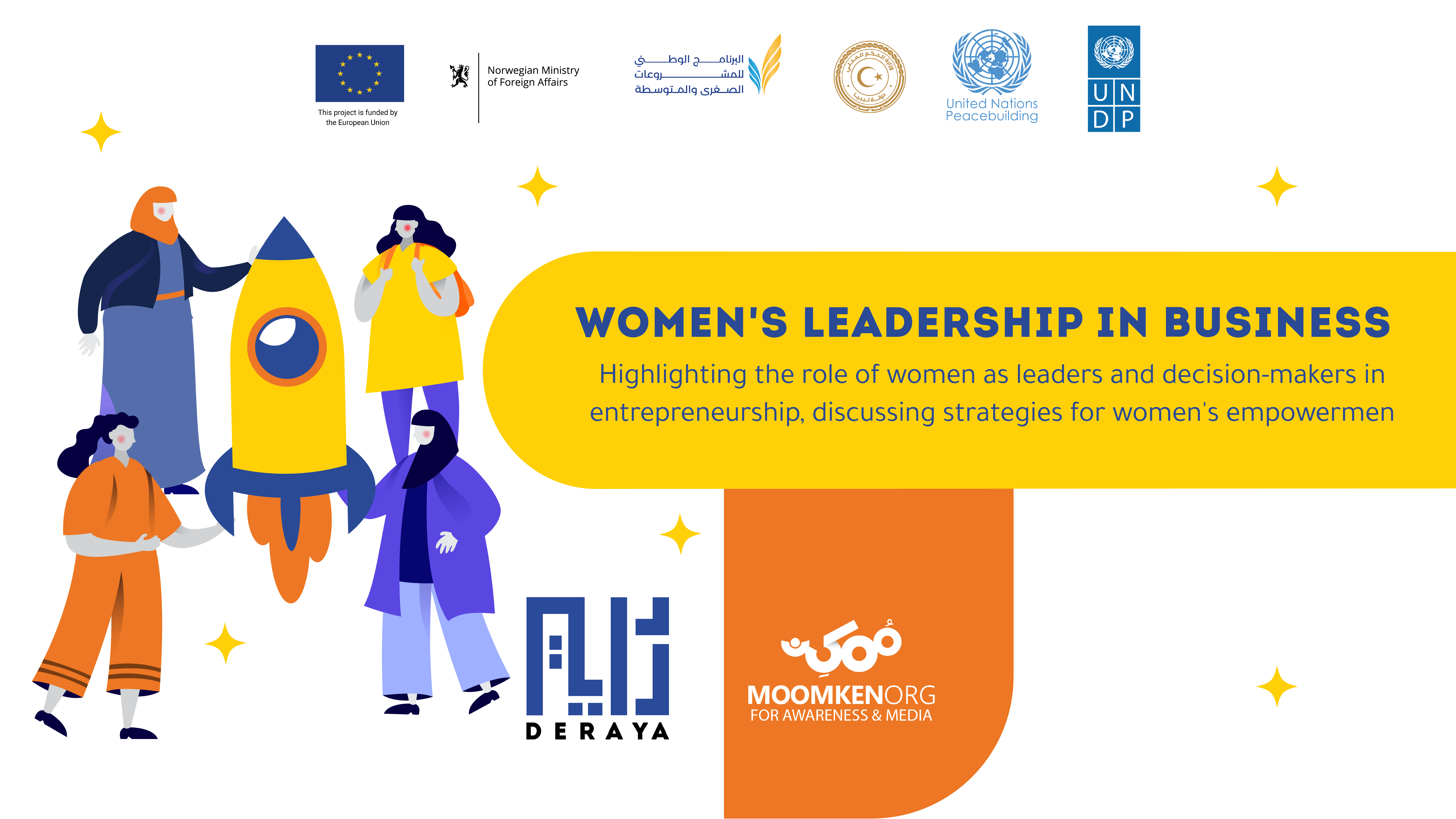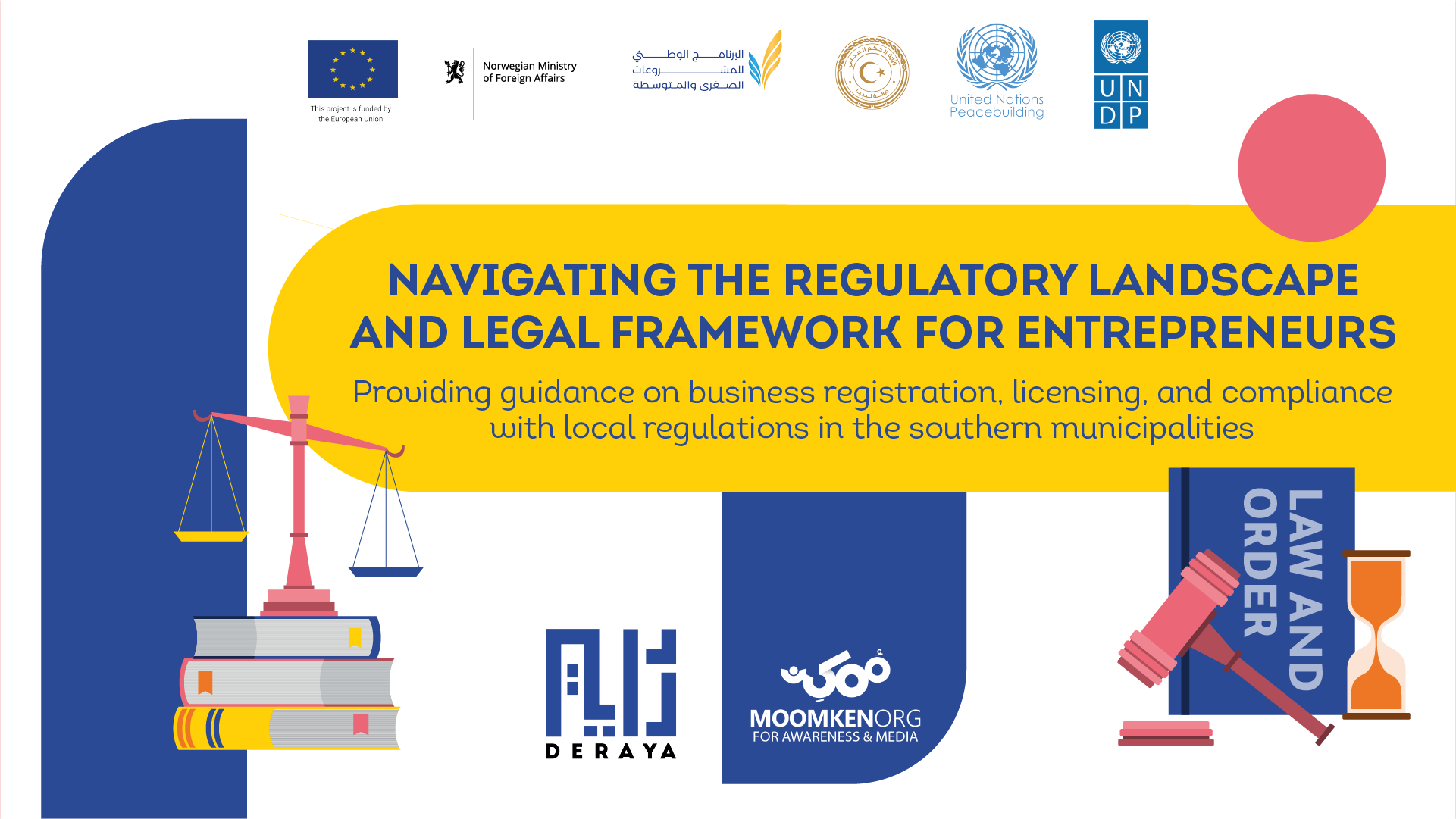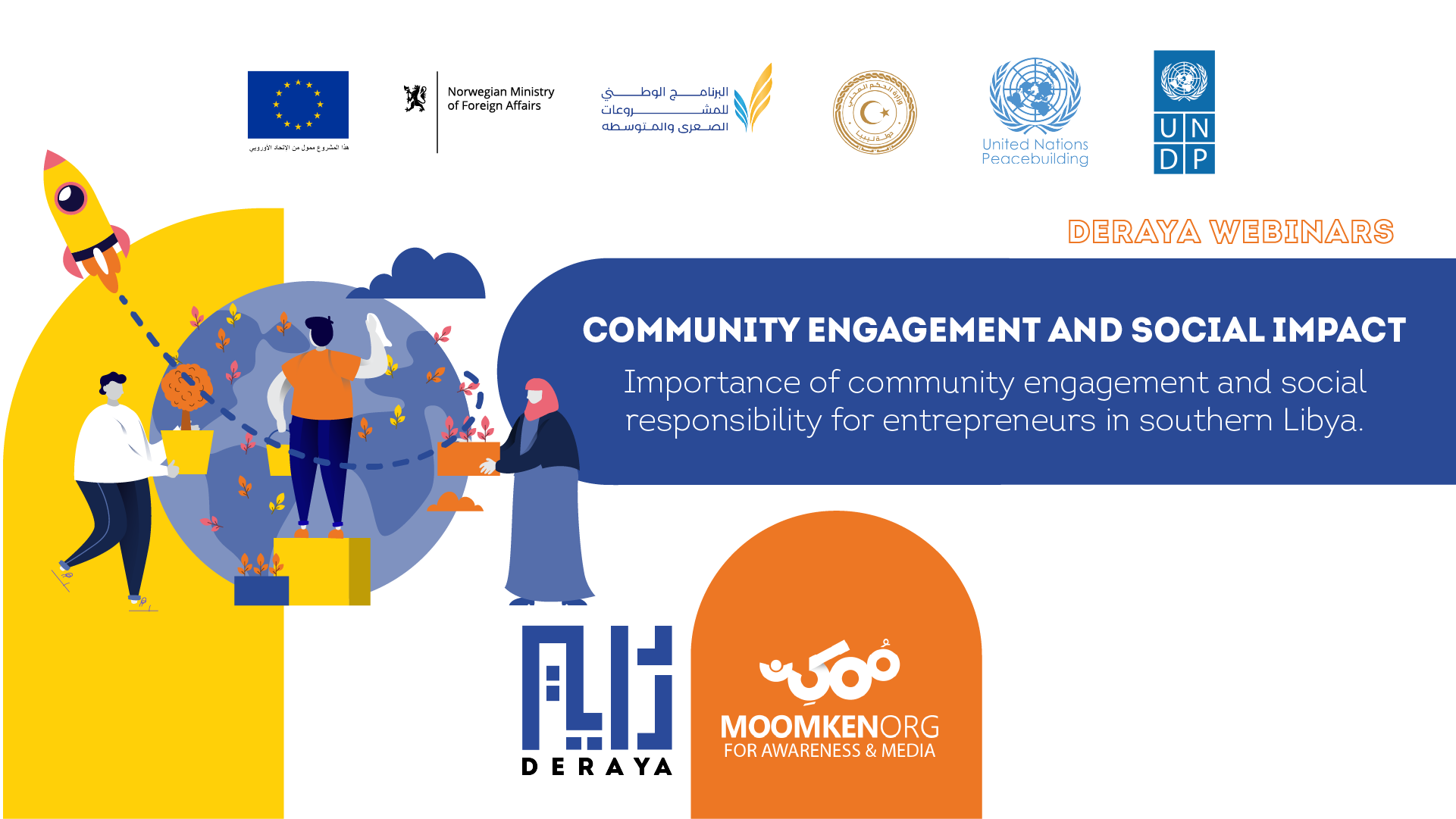Women's leadership in entrepreneurship is a crucial and influential force in the Libya.
Entrepreneurial women are known for their ability to achieve success and drive innovation across various fields. They excel by thinking strategically, managing risks effectively, and creating new, sustainable business models. Additionally, they are skilled at building social networks and forging influential relationships with partners, clients, and investors.
Women in entrepreneurship display remarkable dedication and determination, overcoming challenges and achieving success despite difficulties. Their strong sense of social responsibility often leads them to balance personal success with contributions to societal and environmental development. Recognizing women's leadership as vital to economic and social progress, it is essential to enhance support and opportunities for aspiring female entrepreneurs through a supportive environment, funding opportunities, and training, reflecting society's commitment to equality and sustainable development.
In line with this, this Deraya Webinar hosted a group of successful female entrepreneurs in southern Libya, featuring Mariam Al-Houni, a trainer and consultant in entrepreneurship; Jamila Mansour, director of "Jamila" Sewing Company and a civil society activist focused on women's issues; and Fatima Berkuli, a technical field trainer. To ensure relatability, the Deraya team selected a female entrepreneur from southern Libya, Aziza Adam, as facilitator to lead the webinar.
Section One: Entrepreneurship and Women's Empowerment:
Entrepreneurship and women's empowerment within Libyan society are two fundamental pillars for developing the economy and promoting sustainable development. Libyan women possess significant potential and talents that should be effectively harnessed to achieve progress and prosperity in the country. Mariam Al-Houni stated that "it is essential to raise awareness about the importance of women's empowerment and the need to work on laws that ensure women's economic rights and simplify the necessary procedures, particularly in the field of entrepreneurship. By highlighting successful projects in the southern region, this will significantly contribute to empowering women within these projects and achieving greater empowerment through proper training, consultations, and noticeable support."
Therefore, providing equal opportunities and necessary resources for Libyan women in the field of entrepreneurship contributes to strengthening their role as key partners in economic development. This also enhances diversity and
innovation in the local economy, benefiting society as a whole. By focusing on providing the necessary support to Libyan women in entrepreneurship and enhancing their entrepreneurial skills and capacities, a qualitative shift in the Libyan economy can be achieved, promoting stability and sustainable development. Institutions and organizations can support women entrepreneurs by offering training and development programs, seed funding and financing, operational spaces, advice and mentorship, networking and knowledge exchange opportunities, marketing and promotional support, as well as psychological encouragement and support. Mariam also mentioned, "The difficulty in registration due to the many places required to complete the registration process and the absence of a single place to register all the necessary and required procedures to start a project requires intervention from these institutions to support women entrepreneurs."
Common Misconceptions about Women in Entrepreneurship in Southern Libya
Common misconceptions about women in entrepreneurship include the belief that women are less capable of achieving success in business and that they tend to choose traditional careers rather than investing in their own ventures. Jamila Mansour highlighted that, "Regarding the prevailing ideas faced by women entrepreneurs in the South, the first is the common belief that a woman's place is in her home. We live in a patriarchal society governed by customs and traditions, so it is natural that most or the majority of society does not believe in the work and importance of women within Libyan society." Additionally, there is a stereotype that women lack leadership skills and struggle to balance professional and personal life demands. Despite the prevalence of these assumptions, they do not reflect the true capabilities and potential of women in entrepreneurship. Jamila also pointed out, "The perception of working women is always under scrutiny, with the belief that they are entirely unable to balance professional life and personal life. I always say that with support and encouragement, continuity and success are guaranteed."
There is a common misunderstanding that success is solely determined by financial gain, when in reality, success can also be measured by personal fulfillment, growth, and impact on society. Entrepreneurship is a journey that requires dedication, resilience, and a long-term vision for sustainable success. Jamila added, "Another misconception is the belief in quick profits from the start of a project, although entrepreneurship requires time and patience to achieve the desired goal."
Challenges Faced by Women Entrepreneurs at the Beginning of Their Ventures
Women entrepreneurs still face multiple challenges. These challenges include a lack of funding, as they find it difficult to obtain the necessary financing due to
existing biases against women. They may also face social and cultural biases that limit their roles in society and the market. Overcoming these challenges requires strong support from the community, government, and institutions, as well as a strong will and determination to achieve success and innovation. Fatima Berkuli added, "The idea of convincing an investor or even a specific entity to invest with you is in itself a difficult idea, as society imposes and judges us with social and cultural constraints that we have to comply with."
Additionally, women encounter difficulties in building social networks and obtaining the necessary support. These challenges become more complex when it comes to accessing opportunities and resources needed to develop their businesses, affecting their self-confidence. Mariam Al-Houni added, "Through training and consulting women entrepreneurs, I have noticed the challenge of accessing business opportunities, which includes obtaining funding and contracts for women-owned companies, as men have a greater opportunity to be part of social networks to secure funds and contracts in the field of entrepreneurship."
Women entrepreneurs often face gender biases and discrimination in the business world, making it even more challenging for them to succeed. This lack of support and access to resources can hinder their growth and innovation in the competitive market.
Fatima added "A challenge is the poor management of finances, particularly in cash flow, where expenses in projects are greater than revenues. This is indeed a problem that threatens the sustainability of projects. Solving it requires addressing the issues together. In my opinion, the solution to this problem involves significantly reducing costs while trying to increase sales and intensifying marketing campaigns for the projects." Additionally, she mentioned, "The issue of mixing personal expenses with project expenses is a significant problem that women face, impacting the sustainability of the project by spending from the revenues. The solution to this problem is to allocate a specific budget for personal expenses and separate project revenues and expenses."
Guidance Role in Empowering Women in Entrepreneurship:
Women's empowerment in entrepreneurship requires multifaceted efforts to support their success in this vital field. The guidance role can have a significant impact on providing the necessary environment and resources to motivate women to develop their projects and achieve their entrepreneurial potential. These efforts include providing financial support through loans and specialized financing programs, as well as offering training and professional development to build management, marketing, and innovation skills. Additionally, guidance can encourage the building of social networks and exchange of experiences among women interested in entrepreneurship, enhancing awareness of their contribution to economic and social development. Mariam El Houni mentioned that "the guiding role in empowering women in entrepreneurship is to provide the
necessary information to enter entrepreneurship and other fields, such as marketing, planning, innovation, and financial management. Also, educating women with the necessary information and skills to enter any desired field." She also added, "Providing incentives and encouraging women to have greater confidence in themselves to ensure they reach their goals, pursue their passions, and start their own projects."
Furthermore, technical and advisory support contributes to guiding women, providing them with the knowledge and skills necessary for success in entrepreneurship. Through these integrated efforts, women can achieve their aspirations and play a significant role in driving economic development and promoting sustainability. She further stated, "Guidance provides networking opportunities and communication, building relationships with stakeholders, whether investors, supporters, or even donors. Guidance plays a significant role in guiding businesswomen and developing their projects to achieve their entrepreneurial potential."
Section Two: Businesses to Support Women Entrepreneurs in the South:
Women can also be encouraged to embark on entrepreneurship by fostering a culture of courage and innovation, providing successful female entrepreneurs as a source of inspiration and motivation. Jameela Mansour highlighted that "self-confidence, the ability to progress in entrepreneurship, following passion, and having valuable and realistic goals are fundamentals for any woman who wants to start her own project." She also mentioned, "For anyone wanting to start their project, the project must be built and prepared according to a pre-thought-out plan. The necessity of patience and not thinking about quick profit are important to complete the process. Additionally, it is essential to study the market well, carefully choose the target audience, and have full awareness and knowledge of the market."
Additionally, offering specialized guidance and advisory programs for women considering entering the field of entrepreneurship can assist them in developing their ideas and identifying the necessary steps for success. Providing resources and information about entrepreneurship for women can effectively encourage and empower them to take the first step towards success in this field. She added, "Perseverance and having an adventurous spirit are important for continuity and decision-making. Additionally, it is necessary to have financial and organizational management and a serious working team that can be relied upon to reduce pressure and effort simultaneously."
Harnessing Technology and Digital Platforms for Women's Business Development:
Utilizing technology can also help women entrepreneurs reach a wider audience, improve efficiency, and stay competitive in the ever-evolving business landscape. By embracing digital tools, women can streamline processes, increase productivity, and ultimately achieve greater success in their endeavors.
Fatima Barkouli stated that "women can benefit from technology and digital platforms to develop their businesses through online training using digital platforms, electronic marketing, and e-commerce using social media platforms. Additionally, using artificial intelligence in entrepreneurship and the ability to exploit digital platforms and modern technologies in building advanced ideas and projects." These tools can also help women reach a wider audience, connect with potential customers, and stay competitive in the market. By staying up to date with the latest digital trends and innovations, women entrepreneurs can position themselves for long-term success in their respective industries. She also mentioned, "Focusing on self-learning and accessing the required information in the desired field with the simplest available capabilities, such as using the 'YouTube' platform to search for questions covering this field and receiving immediate answers from several different sources simultaneously."
Women can also use technology to develop new solutions, recruit, participate in online conferences, and use other strategies to enhance their businesses and achieve professional success. Maryam El Houni added that "technology is very important in the field of entrepreneurship, for example, the company 'Vision of Creativity' based in the South is one of the most important companies concerned. Following women entrepreneurs to these companies' projects increases the existing activities, and consequently, they join to participate and be within these communities."
Section Three: Successful Entrepreneurship in the Southern Region for Women:
For women to achieve successful entrepreneurship in the southern region, a series of essential steps and thorough preparation are necessary. Ambitious women should start by investing in skill development and expanding their knowledge in the business sector. Building a robust network of professional relationships is also crucial, as it can offer support, guidance, and advice when needed. Furthermore, women aspiring to excel in entrepreneurship in this region must understand the local labor market and its needs and be adept at analyzing available opportunities.
Women entrepreneurs in the southern region must also be adaptable and willing to innovate in order to stay ahead of competitors. By continuously learning and staying informed about industry trends, they can make informed decisions that will help them stand out in the market. There are groups of women and
businesses and project owners in southern Libya. These groups can provide valuable networking opportunities and support for women entrepreneurs looking to grow their businesses. By collaborating with these groups, women can access resources and knowledge that will help them navigate the unique challenges of the local market. Their remarkable successes in the field of entrepreneurship have been established. Perhaps they have not appeared on the screen before, but their impact is undeniable. By sharing their stories and experiences, these women can inspire others to pursue their entrepreneurial dreams and contribute to the growth of the economy in southern Libya. Their projects are still active and standing to this moment, showing significant and thriving progress.
Personal Tips from Successful Business Leaders:
Throughout this Deraya session the speakers mentioned a variety of tips for success, including the importance of networking, staying focused on goals, and adapting to changes in the market. These insights can be valuable for aspiring entrepreneurs looking to make their mark in the business world. Mariam El Houni mentioned some important points in providing advice to women interested in entering the entrepreneurial field. "Identify ideas and study them well, start with a small project with the possibility of development, build a network of relationships with stakeholders, entrepreneurship requires innovation and avoiding the triangle of women's projects, enhance knowledge and technical skills and benefit from them, ability and readiness to face challenges and difficulties, and finally, desire alone is not enough, there must be two things: the ability to manage the project and real opportunities for the chosen products and projects through thorough market research." She also added, "There is no real balance, especially at the beginning of the project. The project at its beginning requires effort and time to reach the starting point. When you conceive a certain idea, there is no harm in giving yourself the opportunity to participate in training courses for the purpose of benefiting and developing. Patience is the key to survival. Patience to achieve is not easy, but its results are highly satisfactory."
It is important to remember that success does not happen overnight, and it is crucial to stay committed and focused on the long-term goals of the project. By investing time in training and development, one can increase their chances of success in the competitive market. Fatima Barkouli concluded with several points as well, "Self-improvement, skills development, and expanding ideas. Searching for inspiration for passion, receiving and covering needs related to entrepreneurial ideas. Having a source of inspiration and role models in the desired field. Searching in the social environment for inspiring models for motivation and support. Starting with simple steps as a beginning to ensure continuity."
To conclude, Successful women's leadership in entrepreneurship involves balancing strength with humility and determination with flexibility. Key aspects
include making courageous decisions, bearing responsibility, being creative, and thinking strategically. Building relationships and empowering others are vital, as is adapting to changes and pursuing dreams with faith and determination. Inspiring and motivating the team, continuous learning, and growth enable leaders to navigate challenges and seize opportunities in the dynamic business environment.
Other Case Studies
At the beginning, we must understand that...
The Moomken Organisation hosted Hind Al-Bashari,...





